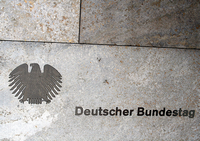When the Berlin Wall fell 20 years ago, the event's historic significance was immediately obvious. A divided Germany had been both the linchpin of the agreements sealed at Yalta and Potsdam in February and July of 1945, respectively, and the central fault line of the divided European continent they created. In what amounted to a recasting of some 300 years of European history, post-War European affairs were conducted under the umbrella of opposing blocs, and peace was based on nuclear deterrence. With the Wall gone, the Cold War political order was swept away. Less than one year later, a reunified Germany emerged, followed by the collapse of the Soviet Union in 1991. With reunification, Germany's historic legacy of aggressive nationalism, militarism, and ideological radicalism raised questions about the orientation of the new Germany. What benchmarks would guide its leaders? Would its increased international weight lead to assertive foreign policy choices, to the detriment of its allies and partners in Europe and beyond? Would it militarize its diplomacy and abandon its multilateral preferences in favor of tactical advantages? In short, would Germany become a "normal" power, expected to put its own interests first? These concerns cut to the chase of European politics. A great power at the heart of the continent is uniquely equipped to dominate East and West, and able to shape the choices of others. In the past, Germany had, time and again, turned geography into geopolitics and its diplomacy into the aggressive pursuit of advantage, while proving unable to resist the weakness of its neighbors. Even when German goals were defensive, the lack of defensible borders, both to the East and West, led to aggressive policies that produced countervailing alliances. Always expecting its autonomy to be challenged, Germany adopted a preventive strategy, with strategic decisions based on anticipating the rising strength of others. Predictably, Germany historically brought about the very conditions it most feared, namely hostile alliances in the West and in the East. In 1990, concerns about a return to this kind of politics were both real and legitimate.[1]
Germany’s Enduring, or Eroding, Foreign Policy Consensus?

